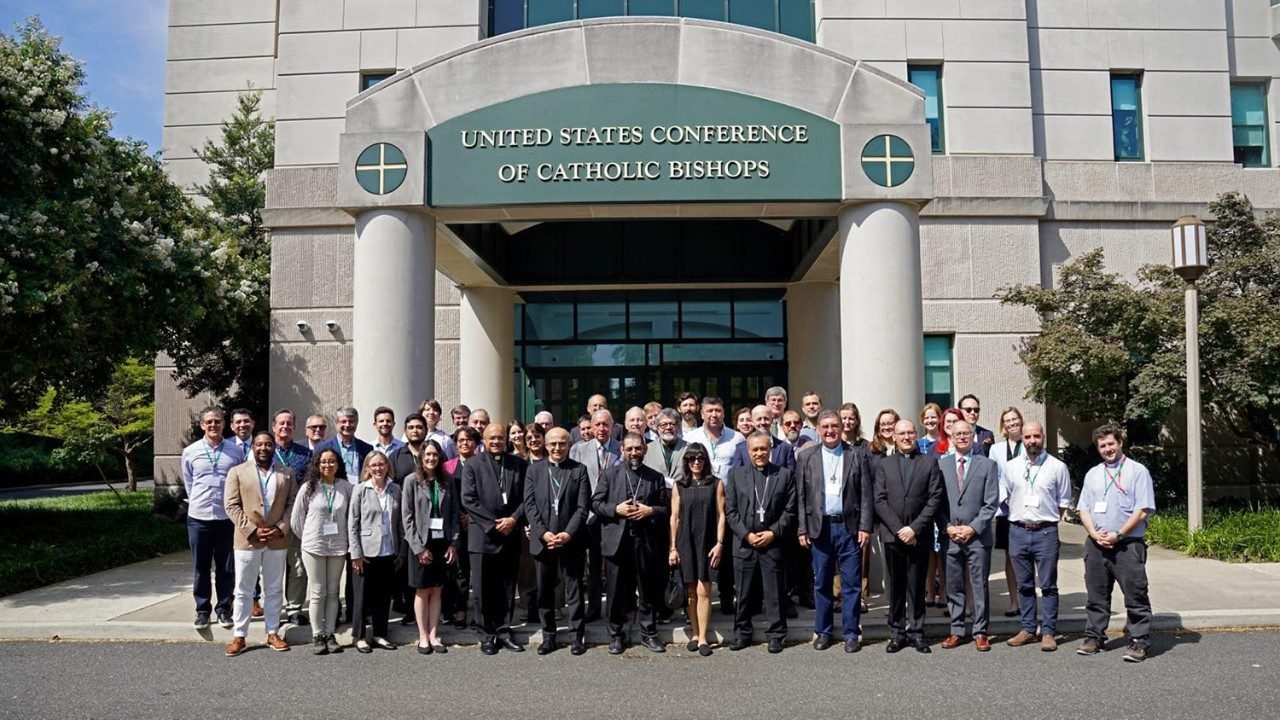
A two-day meeting at the headquarters of the United States Conference of Catholic Bishops in Washington examines the challenges of dignified work, integral human development, and care for our common home.
By Luis Miguel Modino
A historic meeting advanced the cooperation agenda between organized labor groups and ecclesial networks on dignified work and care for our common home at the Third Synodal Meeting Fratelli Tutti: North-South Socio-Environmental Dialogue at the headquarters of the United States Conference of Catholic Bishops (USCCB) in Washington, DC on July 28 and 29.
Collaborating for dignified work and an inclusive economy
“It was a very enriching experience, as a commitment to joint work was established between the world of organized labor and the Church,” as recognized by the organizers, the Latin American and Caribbean Episcopal Council (CELAM) and the Pontifical Commission for Latin America (PCAL). More than 40 organized labor groups from North, Central, and South America participated in the meeting, alongside representatives from international organizations, ecclesial networks, labor unions, businesses, and organized communities across Latin and North America. They were joined by multilateral organizations such as the Organization of Ibero-American States (OEI), the International Labor Organization (ILO), the Organization of American States (OAS), and the International Catholic Commission for Migration (ICMC).
The participants, states the final communiqué, “made a commitment to strengthen North-South intersectoral cooperation and collaborate with the agenda of Pope Leo XIV and the Episcopal Conferences, contributing proposals to consolidate the role of Organized Labor in building a more just and sustainable economy.”
The meeting was led by Bishop of Jales (Brazil) Reginaldo Andrietta representing the South, Bishop of Brownsville (United States) Daniel Flores representing the North, and Nuncio Juan Antonio Cruz, Permanent Observer of the Holy See to the Organization of American States.
A Church open to dialogue with all
During the two-day meeting, “the challenges of the just transition, dignified work, integral human development, and care for our Common Home were discussed, in line with Pope Francis’ call to ‘build bridges of reconciliation, inclusion, and fraternity’ and with Pope Leo XIV’s exhortation for a Church open to dialogue with all,” the communiqué acknowledges.
The participants agreed to reinforce the existing North-South dialogue, expanding the participation of labor organizations, organized communities, and international networks that promote the common good. It was also agreed to hold a meeting in Rome in 2026, expanding the call to representatives from the Global South and strategic sectors such as energy, technology, and the food industry, key to building a more just and sustainable economy. Representing vast networks of organized communities and millions of union workers, alongside key industries and business interests, the participants reflect the broad and influential spectrum of social and economic life across the Americas.
Episcopal presence
A meeting presented an opportunity to “walk together, to find through dialogue and listening, the things that benefit the world at this moment,” said CELAM Secretary General Bishop Lizardo Estrada, who emphasized the need to build bridges to foster dialogue and find common ground for the good of humanity. These were days dedicated to “listening and better understanding the conditions, especially those of workers, immigrants, and business owners, and the challenges we are experiencing as communities,” stated Bishop Daniel Flores. For the Bishop of Brownsville, it is about “better understanding what we have in common as a Church, seeking to defend the dignity of the human being” along with “being able to reach out to people with other perspectives, as part of the Church’s mission,” serving as a “time to truly listen in order to understand.”
Jales Bishop Reginaldo Andrietta emphasized that “this socio-environmental dialogue is an initiative of the Catholic Church, but also open to many participants from the working world.” For the bishop, “we are strengthening the dialogue between Church and society on an issue that is also very urgent: environmental problems associated with social problems.” From there, he called for unity, something that is being achieved with “a very broad coordination of all those who want profound changes in the economic model, which is predatory to the environment and also unreasonable socially.” Therefore, he emphasized “the importance of also uniting the active forces of Latin American and North American society so that together we can find solutions to these urgent problems facing global society.”
Building bridges with all sectors
From the union perspective, Alejandro Gramajo of the Union of Workers of the Popular Economy (UTEP) of Argentina highlighted the debate on strategic issues, seeking to find answers to common problems facing humanity, based on a culture of encounter and with the idea of building bridges with all sectors to find answers to the problems of labor, the environment, poverty, and inequality facing our world. This meeting can serve as a model to be replicated in all countries, according to Clete Kiley of Unite Here/Chicago Federation of Labor.
“It’s a very good opportunity to strengthen social alliances with the participation of the union movement,” something considered very important by Uruguayan Juan Pablo Martínez, political coordinator of the Trade Union Confederation of Workers of the Americas. He says he is convinced that “to contribute to social justice, democracy, and human rights, we need to build a space for articulation between the global South and the entire world with the global North based on these types of strategic alliances among the social actors who are active today in our countries, our regions, and the world.” Hence the importance of the meeting to meet with other organizations, including the Catholic Church, which “opens a very important space to strengthen joint action,” resulting in ideas, proposals, and “the conviction to continue this process of joint work.”
Attacks on democracy
Fredrick Redmond, Secretary-Treasurer of the American Federation of Labor and Congress of Industrial Organizations (AFL-CIO), emphasized the importance of the meeting “given the attacks on democracy, which demand that people of faith, unions, and individuals and communities of good will who believe in justice and freedom unite at this time.”
Along the same lines, Gerardo Martínez, Secretary of International Relations of the General Confederation of Labor of Argentina, emphasized the importance of the diversity of thought present: business leaders, the Social Doctrine of the Church, and union representatives, which offers “a broad rationale for how to act, how to proceed to achieve a better world, a more supportive world, with social justice, where the link that must exist between capital and labor is understood.” He called for a joint journey between business leaders and workers and the need to “achieve a region where social justice, well-being, quality of life, and environmental care are values that represent the pillars of a great America.”
Rocío Sáenz, of the Services Employees International Union, affirmed the importance of “being able to have a voice at this important moment, and of the Church having placed us together with grassroots movements, organizations, and business leaders” to address the care of our common home and seek actions aimed at improving working conditions, community life, and family life, in order to achieve a better world.
Moving forward together
From the Landless Rural Workers Movement in Brazil, Milena Poloni emphasizes the value of these intersectoral meetings to discuss, debate, and propose real solutions for the lives of the peoples of the Americas, seeking “solutions to the problems and dilemmas we face today in our countries, because we all share the same problems and contradictions, and we are here precisely to analyze them, reach a consensus, but also, above all, to move forward together, to overcome all these crises and contradictions.”
The meeting served to “exchange diverse perspectives among different social actors in the world of organized labor,” according to Peruvian Ana Facho Ortiz of the Young Christian Workers of America. Ítalo Cardona, also Peruvian, from the International Labor Organization, emphasized the urgency in today’s world of dialogue on social justice and the importance of the meeting as a space to listen to challenges and difficulties, “so that together we can build solutions that guide us forward in our shared history, defend our common home, and advance the construction of a new social contract aimed at promoting social justice.”
For José Medina Mora Icaza, of the Employers’ Confederation of the Mexican Republic (COPARMEX), the purpose of a company is the integral development of its employees, understood in four dimensions: intellectual, physical, social, and spiritual.




